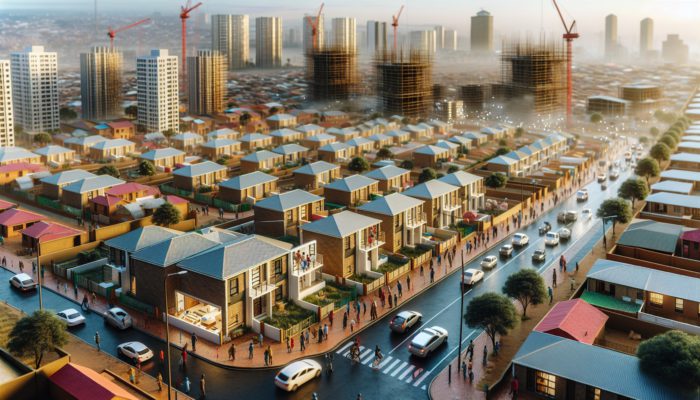
Top Affordable Durban Neighborhoods for First-Time Buyers
Comprehensive Analysis of Durban’s Evolving Housing Market
Exploring the Latest Trends in Durban’s Property Market

Gaining a thorough understanding of the property market dynamics in Durban is essential for first-time buyers seeking to invest wisely. Presently, several pivotal trends are shaping the landscape of affordability in this region:
- The demand for affordable housing has surged, especially following the pandemic, as an increasing number of buyers are actively searching for budget-friendly options.
- Interest rates are on the rise, which may limit purchasing power but also encourages buyers to make swift decisions.
- A noticeable shift is occurring as buyers are favouring suburban locales, where properties are typically more affordable.
- New residential projects are being developed with a focus on catering to first-time buyers, reflecting a significant and growing market segment.
- Property prices are fluctuating, influenced by various economic indicators and local development activities.
These trends underscore the critical need for first-time buyers to remain well-informed and adaptable in their strategies. As the market continues to evolve, it is imperative for buyers to be proactive, conducting thorough research on current listings and comprehending how these trends affect their purchasing power.
Understanding the Key Factors Affecting Housing Affordability
Economic variables, such as employment rates and interest rates, play a significant role in determining the affordability of neighbourhoods within Durban. The strength of the local economy directly influences job availability and, by extension, the capacity of individuals to invest in property. When unemployment rates are low, the demand for housing can increase, leading to a rise in property prices. Conversely, in regions where job opportunities are limited, affordability often improves, making these locations attractive for first-time buyers.
Interest rates also play a crucial role in shaping affordability. As rates climb, the cost of borrowing tends to increase, which may discourage potential buyers from entering the market or force them to lower their budgets. However, government incentives and programmes designed to assist first-time buyers can alleviate some of these financial burdens, making the prospect of purchasing property more attainable.
Top Neighbourhoods in Durban for First-Time Buyers
Several neighbourhoods in Durban have become particularly desirable for first-time buyers due to their affordability and available amenities. Suburbs such as Umbilo, Mayville, and Woodlands are increasingly popular among young professionals and families alike.
Umbilo presents a harmonious blend of affordability and convenience, with an array of amenities, including schools and shopping centres, situated nearby. Mayville is celebrated for its family-friendly atmosphere, featuring numerous parks and recreational facilities, attracting those with children. Woodlands, conveniently located near major transport routes, offers easy access to the city while maintaining relatively lower property prices.
These neighbourhoods not only cater to buyers with budget constraints but also foster a sense of community and provide access to essential services, making them ideal for those stepping onto the property ladder for the first time.
Insights from Experts on Affordable Neighbourhoods in Durban for First-Time Buyers

What Criteria Define an Affordable Neighbourhood?
Affordability within Durban’s neighbourhoods can be influenced by various factors, including property prices, local taxes, and community services. Evaluating affordability requires a comprehensive approach, empowering buyers to make informed choices.
Initially, prospective buyers should examine the average property prices in their chosen neighbourhoods. Reviewing recent sales in the area can offer valuable insights into the prevailing market value. Additionally, local taxes and levies can significantly affect the total cost of ownership, making it essential to grasp these financial obligations before committing to a purchase.
Community services also play an integral role in attracting buyers. Areas equipped with well-maintained parks, schools, and reliable public transport typically experience higher demand, positively impacting property values.
To aid in evaluating affordability, first-time buyers can undertake several actionable steps:
- Research online property listings and sales data to compare prices effectively.
- Consult with local estate agents for insights into neighbourhood trends and pricing.
- Calculate potential additional costs, such as maintenance and rates.
- Visit prospective areas to assess the amenities and services available to residents.
By engaging in these actions, buyers can more accurately assess the true costs associated with homeownership in their desired neighbourhoods.
How Do Experts Assess the Value of Neighbourhoods?
Experts evaluate various factors, including crime rates, school quality, and future development plans, when assessing neighbourhoods in Durban. These elements are crucial in determining a neighbourhood’s desirability and potential for value appreciation over time.
Crime rates serve as a key indicator of a neighbourhood’s safety, which significantly impacts buyer confidence. Areas with elevated crime rates often experience suppressed property values and deter potential buyers. In contrast, neighbourhoods that report lower crime rates tend to be more attractive, leading to heightened demand and increased property values.
School quality is another essential consideration for families. Access to reputable educational institutions is a priority for parents, making areas with high-quality schools more appealing. These neighbourhoods often maintain stable property values as demand continues to rise.
Future development plans are critical for long-term investment considerations. Areas earmarked for growth, such as new transport links or commercial developments, may present excellent investment opportunities, as property values are likely to appreciate. Experts advise examining municipal development plans and engaging with local councils to stay informed about forthcoming projects.
Real-world evaluations often demonstrate that buyers who prioritise safety, educational quality, and potential for future growth tend to achieve better long-term outcomes.
What Should First-Time Buyers Focus On When Purchasing?

First-time buyers in Durban must balance their budget with their lifestyle needs when purchasing a property, with proximity to work and family-oriented amenities being paramount considerations.
Locating a home within a reasonable commuting distance from work can significantly enhance one’s quality of life. Areas well-served by public transport or major road networks can lead to substantial savings in both time and travel costs.
Additionally, family-friendly amenities such as parks, recreational facilities, and schools greatly enhance daily living. Buyers should seek neighbourhoods that provide access to these conveniences, as they tend to foster a sense of community and promote overall satisfaction with their living environment.
Moreover, first-time buyers should prioritise properties that align with their long-term goals. Whether they plan to expand their family, invest in rental opportunities, or eventually upgrade, understanding their future needs can effectively guide their property selection process.
By striking a balance between budget limitations and lifestyle priorities, first-time buyers can make informed decisions that cater to both their immediate needs and future aspirations.
Essential Considerations for Purchasing Property in Durban
Exploring Various Property Types and Their Price Points
Durban boasts a diverse range of property types, from apartments to houses, each with varying price points that can significantly influence affordability for first-time buyers. Gaining an understanding of the different options available is crucial for making a sound investment.
Apartments often serve as the most affordable entry point for first-time buyers, particularly in urban areas. They typically require less maintenance and provide conveniences such as security and shared amenities. Many developments are focused on attracting young professionals and small families, making them appealing for those looking to enter the property market.
Conversely, houses may offer more living space and potential for growth but often come with higher price tags. Factors like location, size, and property condition can drastically affect prices. Suburban areas, while generally more affordable than city centre properties, can vary significantly in price depending on the specific neighbourhood and available amenities.
Buyers should engage in thorough research regarding the types of properties within their budget and assess the associated costs of ownership, including rates, maintenance, and insurance. By comprehensively reviewing their options, first-time buyers can make informed choices that align with their financial capabilities and lifestyle preferences.
What Are the Legal Steps Required for Property Acquisition?
Understanding the legal process of purchasing property in Durban is vital to avoiding potential pitfalls and ensuring a smooth transaction. The key legal steps include:
- Engaging a qualified conveyancer to manage the legal aspects of the transaction.
- Obtaining a property valuation to ensure accurate pricing.
- Conducting thorough due diligence checks, including title deed verification and compliance with local zoning regulations.
- Reviewing and signing the offer to purchase agreement, ensuring all terms are clearly outlined.
- Paying transfer duties and securing financing before finalising the purchase.
Each of these steps necessitates careful consideration and understanding, as failure to comply can lead to complications later on. Buyers must be well-informed about their rights and obligations throughout the purchasing process to facilitate a successful acquisition.
Engaging with knowledgeable professionals, such as real estate agents and conveyancers, can provide invaluable support during this journey, ensuring first-time buyers navigate the legal landscape confidently.
The Significance of Location in Property Value
The location of a property within Durban can dramatically affect its value and desirability, influencing both short-term and long-term investment potential. First-time buyers need to consider various aspects of location when selecting a property.
Accessibility to essential services is of utmost importance. Properties situated near schools, healthcare facilities, and shopping centres generally attract higher demand, which can lead to an increase in property value. Furthermore, areas with reliable public transport links are often preferred by commuters, enhancing their appeal to potential buyers.
The surrounding environment is equally significant. Neighbourhoods featuring green spaces, parks, and recreational facilities typically rank higher in desirability, particularly for families, which translates to stronger property values. In contrast, properties located near industrial areas or high-traffic roads may struggle with demand due to noise and pollution issues.
Investors should also consider neighbourhood trends and growth potential. Areas undergoing revitalisation or development may present excellent opportunities for future appreciation, making them appealing to first-time buyers eager to build wealth through property investment.
By paying close attention to location factors, first-time buyers can select properties that not only meet their current needs but also offer significant long-term investment potential.
Proven Strategies for Identifying Affordable Neighbourhoods in Durban for First-Time Buyers
What Techniques Can Be Used to Negotiate the Best Price?
Negotiating the purchase price of a property in Durban necessitates a solid understanding of the market and knowing the optimal timing for making an offer. First-time buyers should approach negotiations with confidence and a well-researched strategy.
Grasping local market conditions is fundamental. Buyers should investigate recent sales data within their preferred neighbourhoods to assess comparable property values. This information empowers buyers to present compelling arguments during negotiations, aiding in establishing a fair purchase price.
Effective negotiation techniques also involve building rapport with the seller or their agent. Open communication can foster goodwill and heighten the likelihood of a successful outcome. Buyers may leverage any known property flaws or necessary repairs as negotiation points to potentially reduce the sale price.
Additionally, demonstrating flexibility with your terms can play a significant role. If a seller is motivated for a quick sale, proposing an expedited closing date may encourage them to accept a lower price.
Mastering negotiation techniques can yield savings that enhance affordability, allowing first-time buyers to enter the market with confidence and clarity.
Exploring Financing Alternatives Available for First-Time Buyers
Investigating various financing options can assist first-time buyers in Durban in identifying the most suitable mortgage solutions for their needs. Understanding the available choices is vital for making an informed decision that aligns with financial goals.
Traditional bank mortgages remain a prevalent option, offering a variety of loan products tailored to individual circumstances. Buyers should compare interest rates, terms, and conditions across different lenders, as rates can vary significantly.
First-time buyers may also qualify for government-backed initiatives aimed at stimulating homeownership. Programmes like the Finance-Linked Individual Subsidy Programme (FLISP) can support eligible individuals with down payments, making property ownership more achievable.
Apart from conventional loans, buyers can explore alternative financing options, such as private lenders or cooperative housing schemes. These alternatives may provide added flexibility and lower barriers to entry for first-time buyers.
It is equally important for buyers to evaluate their financial readiness prior to pursuing a mortgage. Establishing a budget, improving credit scores, and saving for a deposit can all contribute to securing the best financing options available.
What Long-Term Advantages Can Be Gained from Investing in Property?
Investing in affordable neighbourhoods within Durban can yield long-term benefits, such as property value appreciation and rental income potential. First-time buyers should take these advantages into account when selecting their investment properties.
Properties situated in up-and-coming areas often appreciate at a faster rate than those in already established neighbourhoods. By investing early in a developing location, buyers can reap the rewards of increased property values as demand escalates.
Moreover, affordable neighbourhoods can deliver excellent rental yields. If first-time buyers opt to rent out their property, they could generate a consistent income stream, rendering the investment financially viable. Areas with higher rental demand typically experience lower vacancy rates, further enhancing the stability of the investment.
Comprehending the dynamics of property appreciation and rental markets is essential for making informed investment decisions. By considering long-term benefits, first-time buyers can position themselves for financial success while enjoying the lifestyle advantages that accompany homeownership.
Identifying the Most Affordable Neighbourhoods in Durban
Which Areas Provide Optimal Value for Money?
Certain neighbourhoods in Durban are recognised for offering exceptional value for money, appealing to first-time buyers eager to enter the market. Areas such as Morningside, Greyville, and Clare Estate are increasingly attractive due to their affordability and amenities.
Morningside is renowned for its vibrant community and proximity to the city centre. With a mix of apartments and houses, it provides a range of options catering to various budgets. Its lively atmosphere, complemented by accessible public transport, makes it appealing to young professionals.
Greyville, located near Durban’s iconic racecourse, features a blend of residential and commercial properties. This area’s affordability, combined with emerging developments, presents an attractive opportunity for first-time buyers keen on investing in a location with growth potential.
Clare Estate is another neighbourhood known for its affordability and family-friendly environment. With numerous schools and parks in close proximity, it appeals to families seeking a community-oriented atmosphere while remaining budget-conscious.
These neighbourhoods exemplify the potential for value and community spirit, making them ideal choices for first-time buyers eager to establish roots in Durban.
How Do Local Amenities Influence Property Affordability?
The availability of amenities such as parks, shops, and transport links can significantly impact the affordability of neighbourhoods in Durban, rendering some areas more desirable than others. First-time buyers should consider how these amenities affect property values and overall living experiences.
Areas equipped with ample amenities generally attract higher demand, often leading to increased property prices. Buyers willing to invest in neighbourhoods with robust amenities may find themselves paying a premium for the convenience and lifestyle benefits these areas offer.
Conversely, neighbourhoods lacking essential services may feature lower property prices, making them appealing for budget-conscious buyers. However, this trade-off may result in a less enjoyable living experience and potential challenges in accessing necessary services.
For instance, neighbourhoods with well-maintained parks and recreational areas tend to attract families, while those with vibrant shopping districts and dining options may appeal to young professionals.
Ultimately, first-time buyers should weigh the significance of amenities against their budget constraints, considering not only immediate affordability but also potential long-term implications on property value and quality of life.
Future Development Opportunities and Growth Potential
Understanding future development plans for neighbourhoods in Durban can help first-time buyers identify areas with promising growth and increased value. Local government initiatives and private development projects often signal significant changes that can enhance property desirability.
Areas earmarked for revitalisation or new infrastructure developments may see heightened demand, resulting in property appreciation. First-time buyers should research municipal planning documents, attend community meetings, and engage with local councils to stay informed about prospective developments.
For example, new transport links or commercial projects can dramatically enhance a neighbourhood’s appeal, making it a prime target for buyers. By investing in these areas early on, buyers can realise substantial returns as the community evolves and property values rise.
Furthermore, understanding the growth trajectory of a neighbourhood can assist first-time buyers in making informed decisions. Opting to invest in areas with planned developments that align with their lifestyle needs can enhance both personal satisfaction and financial outcomes in the long run.
How Does Crime Rate Affect Property Affordability?
Crime rates can significantly influence the affordability of neighbourhoods in Durban, with safer areas often commanding higher prices despite offering good value. For first-time buyers, understanding the connection between crime rates and property prices is crucial for making informed decisions.
Typically, neighbourhoods with lower crime rates attract higher demand, resulting in increased property values. Families and individuals prioritise safe environments, leading to a premium on properties within those areas. Conversely, neighbourhoods with higher crime rates may experience suppressed property values, making them more affordable but potentially less appealing for buyers prioritising safety.
First-time buyers should investigate crime statistics as part of their property search. Engaging with local law enforcement or community safety forums can yield valuable insights into the crime landscape, aiding buyers in making informed assessments of neighbourhood safety.
While affordability is important, balancing budget considerations with safety and community wellbeing is essential for first-time buyers seeking to establish a secure and enjoyable living environment.
How Does Proximity to Employment Centres Impact Property Prices?
Neighbourhoods situated near major employment centres in Durban often exhibit higher prices due to increased demand, affecting first-time buyers’ choices. Understanding this dynamic is essential for buyers prioritising convenience and accessibility in their property search.
Properties located close to business districts typically experience heightened demand, which drives up prices. Many buyers value reduced commute times and easy access to workplaces, making these areas highly sought after. Consequently, first-time buyers may find themselves competing for limited inventory, often leading to elevated purchase prices.
However, buyers should also consider the trade-offs. While proximity to employment centres may come at a premium, exploring nearby suburbs or emerging areas can provide more affordable alternatives without sacrificing convenience.
Researching public transport options and commuting times can help first-time buyers pinpoint neighbourhoods that offer the best balance between affordability and accessibility. By broadening their search parameters, buyers can discover hidden gems that cater to both their budget and lifestyle requirements.
Essential Tips for First-Time Buyers in Durban
What Steps Should Be Taken to Conduct an Effective Property Search?
Conducting a thorough property search in Durban involves utilising online tools and collaborating with real estate agents to uncover the best options. First-time buyers should begin by leveraging technology to streamline their search process.
Online property portals such as Property24 and Private Property enable buyers to filter listings based on budget, location, and property type. This can save significant time and assist buyers in identifying properties that meet their criteria. Moreover, social media platforms and local community groups may offer insights into new listings before they hit the market.
Working alongside a reputable real estate agent can enhance the search process significantly. Agents possess invaluable local knowledge and can help buyers navigate various neighbourhoods, ensuring they find properties that align with their needs. They can also provide insights into market trends, further assisting buyers in making informed decisions.
Visiting properties in person is crucial, as online listings may not fully capture a property’s condition or the surrounding neighbourhood. Taking the time to view multiple properties will help buyers differentiate between options and make effective comparisons.
By employing a combination of online resources and professional expertise, first-time buyers can conduct a comprehensive property search that maximises their chances of finding the ideal home.
How to Prepare for the Property Buying Process?
First-time buyers in Durban should focus on financial and emotional preparation for the buying process to ensure they are ready for the responsibilities of homeownership. Adequate planning can help ease the transition into this significant life change.
Financial preparation begins with establishing a budget and assessing overall financial health. Buyers should evaluate their income, existing debts, and potential monthly mortgage payments. Being transparent about financial capabilities can prevent undue stress and ensure realistic expectations throughout the process.
Additionally, saving for a deposit is crucial. A larger deposit can reduce monthly repayments and increase the likelihood of securing favourable financing terms. Buyers should aim to save diligently, taking advantage of any government assistance programmes available for first-time purchasers.
Emotional preparation is equally important. Homeownership entails new responsibilities, from maintenance to financial obligations. First-time buyers should ensure they are ready to commit to these new challenges, recognising that owning a home can be both rewarding and demanding.
By taking the time to prepare both financially and emotionally, first-time buyers can enter the property market with confidence, ready to embrace the journey ahead.
What Common Mistakes Should Buyers Avoid?
First-time buyers in Durban often make common mistakes, such as failing to budget for additional costs and neglecting the importance of a property inspection. These oversights can lead to financial strain and dissatisfaction with the purchasing experience.
One prevalent mistake is not accounting for the various costs associated with homeownership. Beyond the purchase price, buyers must consider transfer duties, maintenance expenses, and utility bills. Creating a comprehensive budget that incorporates these potential expenses is essential to avoid unexpected financial surprises.
Another frequent error is overlooking property inspections. Failing to thoroughly assess a property’s condition can result in unforeseen repair costs and complications after purchase. Engaging a professional inspector can safeguard against such issues, ensuring buyers make informed decisions based on the property’s condition.
Additionally, emotional decisions can cloud judgment. Buyers should strive to remain objective throughout the process, ensuring that choices align with both their financial capabilities and long-term goals.
By steering clear of these pitfalls, first-time buyers can navigate the purchasing process more smoothly, ultimately leading to a more satisfying homeownership experience.
What Should Buyers Know About Durban’s Property Market?
First-time buyers should actively research Durban’s property trends and neighbourhood values to make informed decisions and secure the best possible deals. Understanding the local market landscape is crucial for buyers aiming to maximise their investment.
Researching property trends involves examining historical sales data, current listings, and market forecasts. Buyers should remain informed about fluctuations in property prices, which can provide valuable insights into the optimal time to buy and what to anticipate in terms of appreciation.
Engaging with local real estate professionals can enhance understanding significantly. These experts have in-depth knowledge of neighbourhood dynamics and can offer tailored advice based on individual preferences and goals.
Furthermore, considering socio-economic factors can contribute to a better understanding of the market. Recognising local economic conditions and demographic shifts can illuminate emerging areas ripe for investment.
By dedicating time to research and utilising available resources, first-time buyers can navigate Durban’s property market confidently, empowering them to make strategic and informed decisions.
How to Navigate the Legal Requirements of Property Purchase?
It is imperative for first-time buyers in Durban to grasp the legal processes, including contracts and transfer duties, to ensure a seamless property purchase. Familiarity with the legal landscape can prevent complications and protect investments.
Engaging a qualified conveyancer is essential, as they will oversee the legal aspects of the transaction, including drafting contracts and ensuring all necessary documentation is in order. The conveyancer can also provide guidance on compliance with local regulations and zoning laws.
Understanding transfer duties is equally crucial. Buyers should be aware of the costs associated with property transfer, which vary based on the property’s value. Familiarising oneself with these fees in advance can facilitate better budgeting.
Reviewing the contract of sale is another vital step. Buyers should ensure they understand all terms and conditions, including any contingencies that may affect the purchase. Seeking legal advice when in doubt can clarify complex legal jargon and protect the buyer’s interests.
By navigating the legal landscape with diligence and professional support, first-time buyers can ensure their property purchase is smooth, secure, and legally sound.
Frequently Asked Questions
What is the average property price in Durban?
The average price of a property in Durban varies considerably based on the neighbourhood, with typical prices ranging from R800,000 to R2 million for family homes.
How can first-time buyers qualify for government assistance?
First-time buyers can qualify for government assistance programmes, such as FLISP, by demonstrating their financial need and meeting specified income criteria.
Is it better to buy a house or an apartment in Durban?
It depends on your lifestyle and budget. Apartments are often more affordable and require less maintenance, while houses provide more space and growth potential.
What costs are involved in buying a property?
Costs include the purchase price, transfer duties, bond registration fees, and potential home inspection expenses. It is essential to budget for these additional costs.
How can I assess the safety of a neighbourhood?
Researching local crime statistics, engaging with community forums, and visiting the area at different times can provide valuable insights into a neighbourhood’s safety.
What factors should I consider when selecting a neighbourhood?
Consider proximity to work, availability of amenities, safety, and future development plans. Each element contributes to overall satisfaction and property value.
Is a property inspection necessary before buying?
Yes, a property inspection is vital to identify any potential issues that may require costly repairs. It helps ensure a sound investment decision.
How can I enhance my chances of securing a mortgage?
Improving your credit score, saving for a larger deposit, and ensuring stable employment can significantly increase your chances of obtaining a mortgage at favourable rates.
What legal documents should I prepare for property acquisition?
Prepare identification documents, proof of income, bank statements, and any relevant property documentation. Engaging a conveyancer will help ensure all necessary documents are in order.
What is the typical timeline for the property buying process in Durban?
The typical property buying process can take between 6 to 12 weeks, depending on various factors such as financing and legal checks.













